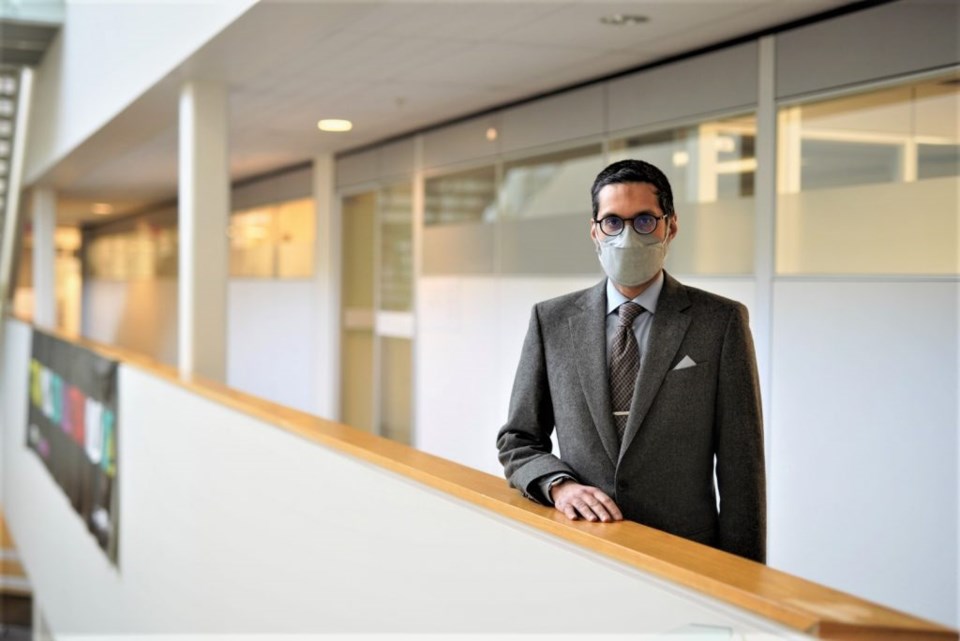
As the region’s acting chief medical officer of health was saying he hoped a mask mandate would be reinstated, the province was announcing that wouldn’t happen. Talking to the press Monday, Dr. Mustafa Hirji called the mandate a “common sense measure,” with cases of COVID on the rise across Ontario.
Dr. Kieren Moore, Ontario’s chief medical officer of health, addressing the press and public Monday for the first time since early March, admitted “it’s clear” we’re now in a sixth wave, and that COVID cases have increased since the mask-wearing mandate was lifted, as have hospitalizations and test positivity rates. He expects the wave could continue until the middle or end of May, he said, and that it could put up to 600 people in intensive care units across the province.
A provincial report shows the latest wastewater data suggests there could be up to 120,000 new cases of COVID daily. Niagara wastewater treatment signals also show an increase in infections, Hirji said. Niagara has an 18.9 per cent positivity rate, with minimal PCR testing, and an average of almost two more people hospitalized with COVID-19 every day.
“Two weeks ago was the time to respond,” he said. “A small increase has turned into a much worse increase.” And it’s “pretty predictable” that it will continue to worsen. While intensive care admissions and deaths are not yet on the rise, they are expected to follow the increase in hospitalizations. Hirji said across the province, many communities are seeing more cases than during the peak of the omicron wave, and although Niagara isn’t there yet, it could be in the next two weeks.
Hirji was also hoping to hear the province would be expanding access to COVID antiviral treatments, and increased availability for PCR testing. Both of those were promised by Moore Monday, along with a strong recommendation for mask-wearing at indoor events, but no mandate.
As outbreaks continue in many schools, Hirji also said he would like masks to be mandated for students and staff. Although no data has been available since the province discontinued a reporting requirement, there is evidence both students and staff are becoming infected with COVID at higher rates than during other waves, and some boards are experiencing huge staff shortages
Some school board trustees across the province have asked for the mask mandate to return to schools, but Moore said Monday he is not planning to do that.
He did say if cases continue to rise, there could be a time when he would reconsider.
Hirji said while he could institute a local mask mandate, it would be more effective if the province makes that move. “If we’re a little island, it’s not going to work as well. It really needs to be province-wide.”
Moore also asked people to self-test when they have symptoms, and to get vaccinated, whether for first, second or third doses.
Hirji would also like to see proof-of-vaccinations updated to include third doses, but the provincial announcement made no mention of bringing back proof-of-vaccination measures.
To prevent further spread of infection, Hirji called for paid sick days, and “a culture of staying home when people are sick.” He suggested those who are eligible for antiviral medication such as Paxlovid — the province released eligibility information Monday — should check with their primary care physicians as soon as possible to begin the pathway to treatment. That would lead to a referral to the assessment clinic in Niagara Falls, and an evaluation of whether anti-viral treatment is suitable, he said — there are issues about it mixing with other medications, and other medical factors to be considered before it’s prescribed.
It’s especially important for those who are not vaccinated, to reduce the chance of a serious case of COVID and hospitalization, Hirji added, “but the people most in need of treatment are not taking COVID seriously,” and are less likely to consider anti-viral treatment.
The province announced Monday that participating pharmacies should also be dispensing it to those with a prescription this week. A positive test result is required to be assessed for antiviral treatment, and it must be started within five days of the onset of symptoms, Hirji said.
The new eligibility requirements announced on Monday includes high-risk individuals who are immunocompromised and may be at higher risk of severe side effects after contracting COVID-19. The following groups are now eligible for PCR testing and assessment for antiviral treatments such as Paxlovid:
* Individuals aged 70 and up
* Individuals aged 60 and up with fewer than three vaccine doses
* Individuals aged 18 and up with fewer than three vaccine doses and at least one risk condition (For example, a chronic illness, heart disease, obesity, diabetes, etc.).